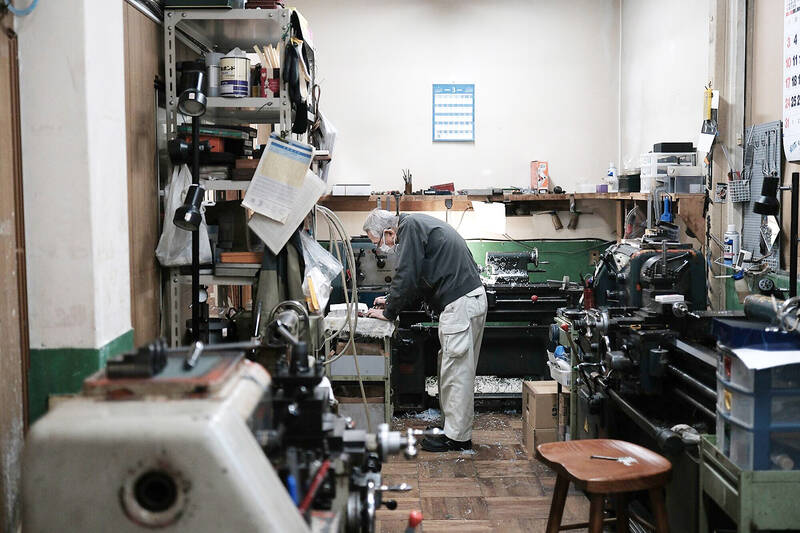Japan’s largest union group yesterday announced stronger-than-expected annual wage deals, a result that could fuel already intense speculation that the Bank of Japan (BOJ) would next week raise interest rates for the first time since 2007.
The Japanese Trade Union Confederation, known as Rengo, said its members have so far secured deals averaging 5.28 percent, a figure that far outpaces the initial 3.8 percent tally of a year ago.
Many of Rengo’s affiliated groups had already announced agreements to hike wages by 5 percent or more.

Photo: Bloomberg
Base pay deals averaged 3.7 percent in the first tally of results, compared with 2.33 percent a year earlier, it added.
The stronger-than-expected result might be enough to convince the BOJ to end the world’s last negative rate on Tuesday next week, instead of waiting until April. The central bank has long pursued a goal of achieving sustainable 2 percent inflation. A key component of that goal is setting in motion a virtuous cycle in which wage growth feeds into demand-led price gains.
“This clears the last hurdle for the BOJ and I think it will scrap its negative rate next week and make a shift toward policy normalization,” said Taro Saito, head of economic research at NLI Research Institute. “If they stand pat now, markets will get volatile and the yen is likely to plunge.”
While yen strengthened after Kyodo News reported that the figure would top 5 percent ahead of the release, the currency reversed gains amid broad strength in the US dollar.
Its muted trading was also an indication that market players are yet to be entirely convinced that the BOJ would move on Tuesday.
“The market has largely priced in the strong outcome,” said Keiichi Iguchi, a senior strategist at Resona Holdings Inc in Tokyo.
“Rengo’s figures are eye-popping. Although the results are still preliminary, now the odds are high for Japan’s economy to finally have the solid wage growth that has long been a missing piece for the BOJ since it started its experiment of massive monetary easing,” Bloomberg economists said.
The results show that a combination of bumper profits at companies along with a labor shortage, ongoing inflation and government pressure has helped convince boardroom executives across Japan they need to raise pay by more than in past years.
Toyota Motor Corp, Japan’s biggest company by market capitalization, said it agreed to its union’s pay demands in full with record raises, and a slew of unions announced results on Wednesday that exceeded last year’s gains.
Some executives have also bought into the idea that Japan as a nation has to do more to escape from its decades of deflation.
“To keep the current momentum, we have to keep raising wages and make people feel, ‘Wow, we can consume,’” Suntory Holdings Ltd CEO Takeshi Niinami said. “The key thing definitely is that we have to finish the deflationary spiral.”

When an apartment comes up for rent in Germany’s big cities, hundreds of prospective tenants often queue down the street to view it, but the acute shortage of affordable housing is getting scant attention ahead of today’s snap general election. “Housing is one of the main problems for people, but nobody talks about it, nobody takes it seriously,” said Andreas Ibel, president of Build Europe, an association representing housing developers. Migration and the sluggish economy top the list of voters’ concerns, but analysts say housing policy fails to break through as returns on investment take time to register, making the

‘SILVER LINING’: Although the news caused TSMC to fall on the local market, an analyst said that as tariffs are not set to go into effect until April, there is still time for negotiations US President Donald Trump on Tuesday said that he would likely impose tariffs on semiconductor, automobile and pharmaceutical imports of about 25 percent, with an announcement coming as soon as April 2 in a move that would represent a dramatic widening of the US leader’s trade war. “I probably will tell you that on April 2, but it’ll be in the neighborhood of 25 percent,” Trump told reporters at his Mar-a-Lago club when asked about his plan for auto tariffs. Asked about similar levies on pharmaceutical drugs and semiconductors, the president said that “it’ll be 25 percent and higher, and it’ll

NOT TO WORRY: Some people are concerned funds might continue moving out of the country, but the central bank said financial account outflows are not unusual in Taiwan Taiwan’s outbound investments hit a new high last year due to investments made by contract chipmaker Taiwan Semiconductor Manufacturing Co (TSMC, 台積電) and other major manufacturers to boost global expansion, the central bank said on Thursday. The net increase in outbound investments last year reached a record US$21.05 billion, while the net increase in outbound investments by Taiwanese residents reached a record US$31.98 billion, central bank data showed. Chen Fei-wen (陳斐紋), deputy director of the central bank’s Department of Economic Research, said the increase was largely due to TSMC’s efforts to expand production in the US and Japan. Investments by Vanguard International

WARNING SHOT: The US president has threatened to impose 25 percent tariffs on all imported vehicles, and similar or higher duties on pharmaceuticals and semiconductors US President Donald Trump on Wednesday suggested that a trade deal with China was “possible” — a key target in the US leader’s tariffs policy. The US in 2020 had already agreed to “a great trade deal with China” and a new deal was “possible,” Trump said. Trump said he expected Chinese President Xi Jinping (習近平) to visit the US, without giving a timeline for his trip. Trump also said that he was talking to China about TikTok, as the US seeks to broker a sale of the popular app owned by Chinese firm ByteDance Ltd (字節跳動). Trump last week said that he had